- Home
- Sharyn McCrumb
The Windsor Knot
The Windsor Knot Read online
The Windsor Knot
Sharyn Mccrumb
Mystery-solving Anglophile anthropologist Elizabeth MacPherson returns with wedding plans that are interrupted by County Sheriff Wesley Rountree's arrival with an ornate urn-not as a gift, but as a prime exhibit in a murder case.
Sharyn McCrumb
The Windsor Knot
The fifth book in the Elizabeth MacPherson series, 1990
For Roy and Jean Faulkner,
Accessories Before the Fact
CHAPTER 1
TWO-THIRDS OF THE people on the list would have to be eliminated and the decision rested with Adam McIver, aged twenty-nine, a minor civil servant in Her Majesty’s government.
McIver, late of Fettes College and the University of Edinburgh, stared wearily at the list of names on the otherwise empty expanse of mahogany in front of him. On the other side of the table, Sir Spencer Duff-Binning (Cambridge, late Pleistocene) was sprawled in his black leather captain’s chair, his nose buried in the current issue of The Sun (which he kept tucked inside a copy of the more respectable newspaper, The Scotsman). Although he was the project director, and in theory even more responsible for the decision than Adam, he was apparently unconcerned with the grave task that lay before them. The decision had to be made at once, and Sir Spencer Duff-Binning (known as the Old Duffer only after his departure from the building) did not seem inclined to be helpful.
Twice now Adam had cleared his throat meaningfully and remarked, “Well, better get on with it!” The only response from the portly figure behind the newspaper was a grunt and a rustle of pages. Adam glanced at his watch, and again at the paperwork in front of him. He had just cleared his throat for the third time, intending to make a more direct suggestion for getting to work, but his introductory utterance was drowned out by the clatter of a metal cart and the call of “Tea time!” shouted in brassy Glaswegian from the doorway. Adam sighed and summoned a pale smile for Mrs. Drury, the tea lady, who was maneuvering her cart into the room as if she were docking a destroyer.
Another distraction.
Sir Spencer looked up from his newspaper with a happy smile and waved her over. “Got any chocolate Bath Oliver biscuits today, Mrs. D.?”
Adam inspected the cake selection without favor. “Just tea, thanks.”
While Sir Spencer and Mrs. Drury nattered on about their respective gardens, name-dropping flowers at a dizzying rate, Adam accepted his cup of tea and returned his attention to the list. When he had chosen a career in the civil service, he had been fully prepared to accept the gravest responsibilities in carrying out his country’s affairs of state. Just now, though, he was finding it a bit difficult. In some ways officialdom in Edinburgh’s Old St. Andrews House was much as he had imagined it from childhood. He looked around the oak-paneled room, with its shelves of gilt-titled books, black marble fireplace, and the blue government-issue Wilton carpet. It looked like a room in which major policy decisions ought to be made. Except in wartime. Where did the major historic events take place then?
“In tents, I suppose,” said Adam, thinking aloud.
Sir Spencer stopped stirring his tea and looked up. “What’s that?”
“Nothing, sir. Just wondering where the country’s great decisions are made.”
“In tents, you said? Absolutely. Quite a lot of policy decisions are made in tents. Except in wartime, of course. It’s castles, then. Or fortified basements. But nowadays, tents are the usual thing. Diplomats crowd under them at state funerals, when they get together to do a little bargaining between the psalms, so to speak. Rally round the punch bowl at garden parties. Ascot. That sort of thing.”
“Railway carriages, too,” said Adam, still thinking of history.
“Oh, that,” said Sir Spencer in chilling tones. “Well, it guaranteed the succession, but I’d hardly call that particular episode a policy decision.”
“Ending World War I not a policy decision?” said Adam. “I was thinking of the Armistice. It was signed in a railway carriage in France, wasn’t it?”
“Oh, that. Indeed,” said the old man, more red-faced than usual. “I thought you were referring to an incident in the courtship of the present Prince of Wales.”
Blushing, Adam returned to the subject of his immediate concern. “I’m in a bit of a funk over this list,” he admitted. “It’s quite a solemn responsibility.”
Sir Spencer’s attention strayed back to page three of his newspaper. “Well, just make a little cross beside the names that you select,” he said. “I’ll back you up. There’ll be no whining from the rest, you know. They’re British, aren’t they?”
“Well… actually, I believe we have to include fifty Americans.”
“Yes, but you don’t have to choose them. Their ambassador will do that. Get on with it. Who have you got so far?”
“Director-general of the Forestry Commission, the Regius Keeper of the Royal Botanic Gardens, the chairmen of the Bank of Scotland and the Royal Bank of Scotland, the lord provost of Edinburgh…”
Sir Spencer was not impressed. “Those are the easy ones,” he said with a smirk.
Adam nodded in agreement. “I know. It’s the others that I feel for. Those who have only one chance.”
Mrs. Drury had been making a great show of attending to the tea service so as not to be thought eavesdropping, but this last declaration had rendered all pretense of disinterest useless. “Excuse me, I’m sure,” she said, straining for a peek at the document. “But about your list there-oughtn’t you to put in a lot of doctors and nurses?”
Adam frowned. “Well, we have a couple of surgeons, of course, and two veterinary surgeons, but… nurses?”
The tea lady nodded. “It seems to me that medical folk-and firemen, now that I think of it-are the sort of people that ought to have first place in the fallout shelters. Not bankers!” She sniffed at the impracticality of bureaucrats.
Adam was at sea. “I’m sorry,” he stammered. “Fallout shelters?”
Mrs. Drury pointed to his list. “Aye. You’ve been talking about your grave responsibility of deciding who should be included. What else could it be?”
“Something even more momentous,” said Sir Spencer solemnly. “We are determining who shall be asked to the Queen’s garden party in Edinburgh.”
Mrs. Drury shook her head. “Fallout shelters is easier. Them that gets left out won’t be around to argue with you.” With that pronouncement, she pushed the tea cart toward the door, leaving them to their task.
Several minutes later Adam McIver stopped in mid-check mark as he noticed the next name on the list. “Hel-lo!” he cried. “Cameron Dawson! I was in school with him.”
Sir Spencer grunted. “What’s he down for?”
Adam consulted the biographical sheet. “It says here that he’s a marine biologist. Doctorate from Edinburgh. Areas of specialization something-something; papers in-oh, here we go. Remember when we had that epidemic among seals in the North Sea? We were afraid that they were all dying of pollution.”
“Vaguely,” said Sir Spencer, who preferred horses to seals.
“It turned out that they had distemper. One of them had been bitten by a dog on a beach somewhere. Apparently, Cameron Dawson was one of the people who discovered what disease the seals had, and he worked to control the epidemic. Imagine that! Old Cameron-a medical hero.”
“Excellent, McIver. Send him an invitation. You’ll get no end of gratitude from your school chum, and it will go down well with the Duke of Edinburgh, because he’s chairman of the World Wild Life Fund.” He waved the last Bath Oliver biscuit at McIver. “Send Dr. Dawson to Her Majesty’s Scottish garden party. Kill two birds with one scone.”
Cameron Dawson frowned at the official-looking ivory envelope, fear
ing the worst.
His younger brother Ian, who had joined him for tea in the garden, was helping himself to a scone and clotted cream. One of the nice things about being home from college for the summer was that you got to eat decent food again. Ian planned to consume quite a lot of it before the fall term began at Strathclyde.
“Do you want that last ginger biscuit, Cameron?” he asked as he reached for it. When no reply was forthcoming, Ian glanced at his brother, who was still staring at a small ivory envelope. Noting Cameron’s stricken expression with interest, he asked, “Anything the matter?”
“Not until now,” murmured Cameron, still staring at the letter.
The afternoon had thus far been remarkably pleasant for early June in Edinburgh: it was sunny after only an hour of misting rain, and so warm that one needed only a cotton sweater instead of a wool one. Cameron’s yearlong stay as a visiting professor of marine biology at a university in Virginia had considerably reduced his tolerance to the climate of his native Scotland. Today, though, had been quite satisfactory, and having spent his first few days home visiting with family and friends, he had decided to spend the afternoon in the garden so that he could bask in the sunshine while he caught up on accumulated mail and bank statements and other bits of paperwork that had arrived too recently to be forwarded to him in America. He had been enjoying colors of the well-tended garden, with its well-pruned privet hedge, its herbaceous border, and the unfortunate, but nevertheless familiar red-hatted garden gnome, who stood smirking by the forsythia bush. As he leafed through newsletters and back issues of magazines, Cameron savored the aroma of his mother’s prize roses. There was nothing to occupy his mind except the prospect of afternoon tea. This peaceful interlude under the rowan tree had been spoiled by the discovery of an official-looking envelope tucked into a pile of advertising circulars from Halford’s. Trust Ian to miss an important letter-probably with dire consequences! And the prospect of having to cope with this disaster spoiled his serenity just as the tea arrived.
“What is it, then? Inland Revenue?” asked Ian, dumping sugar into his teacup. “Getting you for all that money you made in the States?”
“Shut up, Insect,” murmured Cameron. “You should have forwarded this to me, or else opened it and phoned me about it. It’s rather important looking. Addressed to Dr. Cameron Dawson.”
“Ye-ess,” said Ian gravely. “That is you, is it not? Or have you an evil twin that I am unacquainted with? I don’t think I could stand the thought of another sibling at this late date.”
Cameron opened the envelope and took out a card-sized invitation, printed in graceful script. He read it twice. “I was afraid of this.” He sighed, handing the letter to his brother.
Ian’s eyes widened at the sight of the royal coat of arms. “It’s from-” He scanned the card, muttering an occasional word aloud. “Well, imagine that! An invitation to the Royal Garden Party! Did someone from Fettes put you up for this? I sense an Old School Tie dangling over all this.”
“Adam McIver, I expect. He was always a proper little prat, quite intent on government service. The bugger!”
“Steady on, Cameron. It’s only a tea party. You act as if you’d been commissioned in the Light Brigade.”
“Yes, Ian, but you don’t comprehend the possibilities for trouble here. You see, they’ve just invited me. And you know what a maniac Elizabeth is about the Queen. She’s always reading royal biographies and asking me daft questions about the latest palace scandal, as if I’d know anything about it. She may even have been named for the sovereign, for all I know.” Cameron sighed. “I suppose that I could ring up the committee and ask them to invite Elizabeth as well.”
“Not a hope,” said Ian. “No guests except spouses and unmarried daughters. You haven’t any of those, I trust?” he added mischievously.
“Elizabeth and I are engaged…”
“I don’t believe fiancées are permitted to attend.” Ian chuckled. “There’s many a slip twixt-”
“No, I realize that,” snapped Cameron. “But if I go to the Royal Garden Party without telling her, and somehow Elizabeth finds out that she missed a chance to meet the Queen-”
“Second American Revolution.” Ian nodded. “Absolutely. It’s curious, isn’t it, how starstruck the Yanks are about our royal family? Makes you wonder why they seceded from the empire in the first place.”
Cameron looked again at the invitation with Her Majesty’s seal for a letterhead. “They do seem to dote on the royals, don’t they? People were always asking me if I knew any of them. Elizabeth even has a complete set of royal-family coffee mugs. Only Prince Edward is cracked.”
“Yes, I’d heard that,” said Ian, grinning wickedly. “Well, brother dear, what’s it going to be? The Queen’s tea party or the Boston tea party?”
“I’ll just explain to Elizabeth that with the garden party only three weeks away and the wedding planned for next summer, we can’t possibly manage. They might not include her as an afterthought in any case…”
“Surely Old Adam could put in a word for you,” said Ian with a smirk.
“Or perhaps I won’t mention it to her at all. After all, how could she find out about this invitation?”
Ian strove to look unconcerned.
Cameron scowled at his younger brother. “You would, too, wouldn’t you?” he muttered. “Oh, all right! I suppose I’ll have to mention it to her before I write my reply-with fulsome apologies for the delay! As for Elizabeth, I’ll just reason with her.” Cameron clambered out of his lawn chair and started for the house.
“You’re going to ring her up now-while the rates are high?”
“Yes,” said Cameron. “I want to get it over so I don’t brood about it. What time is it in America?” he asked.
Ian called after him, “1776!”
CHAPTER 2
AT A PICTURESQUE university in the Blue Ridge of southwest Virginia, the mountain laurel blossomed on shady hillsides and the squirrels scampered under the oaks on the campus quad. All this was wasted on Elizabeth MacPherson, who hunched over a technical journal in the shabby, windowless cubicle reserved for graduate students in forensic anthropology. Her thoughts were far from queen and empire: she was reading about maggots.
The scholarly article detailing the usefulness of insect life in determining time and place of death almost sanitized the subject past the point of gruesomeness. Almost, but not quite. Elizabeth found herself scratching her just-washed hair and brushing imaginary specks of dirt off her khaki skirt. She thought it odd that a mere article would make her squeamish, considering that the examination of corpses was a routine occurrence for her. As a graduate student in forensic anthropology, Elizabeth had become accustomed to all manner of unsavory exhibits. She was inured to gruesome sights, but she had difficulty in controlling her imagination-and that was the trouble with the journal article. Besides, it awakened a childhood memory of her brother putting a fishing worm down her back. She shuddered, remembering the feel of writhing coldness, when she suddenly noticed the word Scotland on the page in front of her. With a smile of anticipation, she returned her attention to the text. Maggots were still disgusting, but Scottish maggots seemed more… palatable was definitely not the word she wanted.
The case description began: September 29, 1935, about forty miles south of Edinburgh… That would have been in Dumfrieshire, thought Elizabeth, picturing a golden autumn day in the hills of the southern uplands bordering England. A woman was crossing a stone bridge near the town of Moffat when she noticed a bit of color in the stream below. A closer look sent her screaming toward the village: the flotsam in the water was a severed human arm. The Scottish police searched the banks of the stream for days thereafter, eventually finding more than sixty butchered fragments, including two heads, a pelvis, some feet, and a pillowcase full of flesh, all teeming with insect larvae. (At this point in the narrative Elizabeth resolved to stop visualizing the scene.)
The killer had removed all identifying characteris
tics-eyes, ears, fingertips-from the bodies of the women, but through diligent inquiry the police learned that two women, Isabella Ruxton and her maid Mary Rogerson, were missing from over the border in Lancaster, and that they had been on their way to Edinburgh. Isabella’s husband, Dr. Buck Ruxton, insisted that the women were not missing, but they could not be found in Edinburgh, and no one recalled seeing them along the way. Dr. Ruxton, who was known to be notoriously jealous, was charged with murder. But when did the killings occur? The police theorized that the women died on September 19, days after they left Lancaster, which would have provided a good alibi for the doctor.
To test this theory, investigators took maggots from the body parts and sent them to Alexander Mearns at the University of Glasgow. Not a pretty job, but a useful one, thought Elizabeth, turning the page. Mearns recognized the larvae of the bluebottle fly and drew up a timetable of their life cycle. Allowing for cold autumn weather to slow the process, Mearns declared that the bodies had been dumped in the ravine near Moffat on September 16, the day after their disappearance, and at the subsequent trial Dr. Ruxton was found guilty of murder.
The Ruxton case marked the first time that maggots had been used to determine time of death. It was one of the historic moments in the annals of her often-unglamorous profession. Elizabeth thought of mentioning this Scottish achievement to her fiancé, but decided that he might not regard it as romantic or complimentary to his homeland. Still, it was interesting. She made a note of the Ruxtons.
The round clock tacked on the cinderblock wall said eight minutes after eleven. If the article became any more graphic, lunch could be postponed indefinitely, which was just as well, she thought, straining to insert her finger into the waistband of her skirt. Perhaps she ought to go in search of more maggot articles for future lunchtime reading. Or she could try Bride’s magazine. That ought to do it. Where did they find those models? Bangladesh? Elizabeth had resolved not even to daydream about her year-off wedding until she had discernible cheekbones.

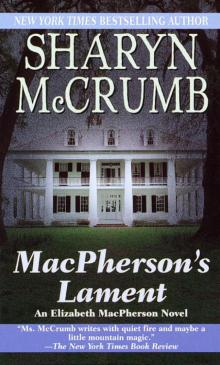 Elizabeth MacPherson 07 - MacPherson’s Lament
Elizabeth MacPherson 07 - MacPherson’s Lament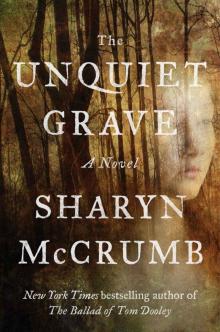 The Unquiet Grave: A Novel
The Unquiet Grave: A Novel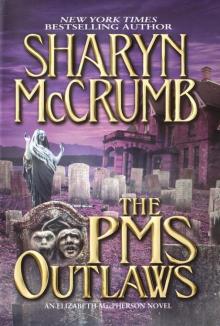 The PMS Outlaws: An Elizabeth MacPherson Novel
The PMS Outlaws: An Elizabeth MacPherson Novel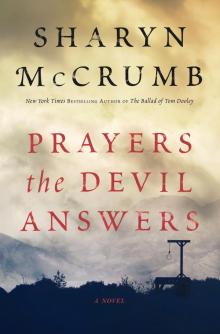 Prayers the Devil Answers
Prayers the Devil Answers Paying the Piper
Paying the Piper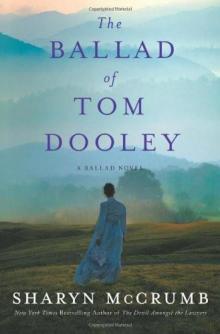 The Ballad of Tom Dooley: A Ballad Novel
The Ballad of Tom Dooley: A Ballad Novel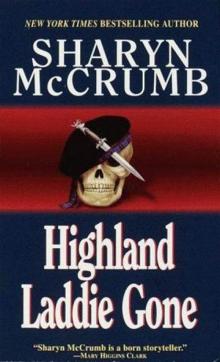 Highland Laddie Gone
Highland Laddie Gone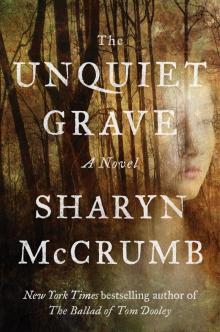 The Unquiet Grave
The Unquiet Grave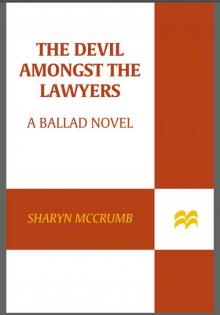 The Devil Amongst the Lawyers
The Devil Amongst the Lawyers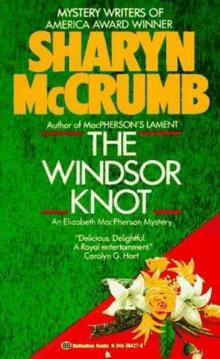 The Windsor Knot
The Windsor Knot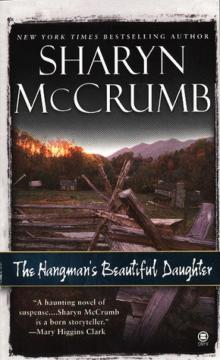 The Hangman's Beautiful Daughter
The Hangman's Beautiful Daughter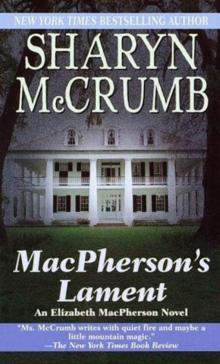 MacPherson's Lament
MacPherson's Lament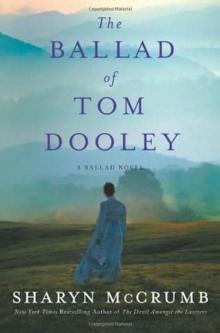 The Ballad of Tom Dooley
The Ballad of Tom Dooley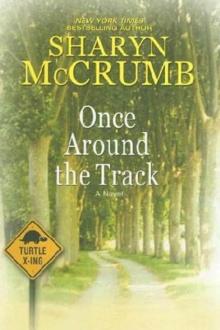 Once Around the Track
Once Around the Track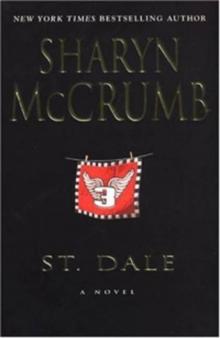 St. Dale
St. Dale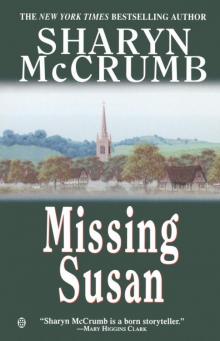 Elizabeth MacPherson 06 - Missing Susan
Elizabeth MacPherson 06 - Missing Susan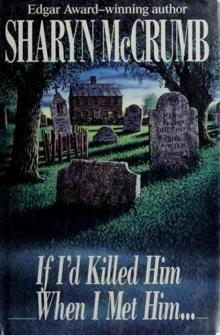 If I'd Killed Him When I Met Him…
If I'd Killed Him When I Met Him…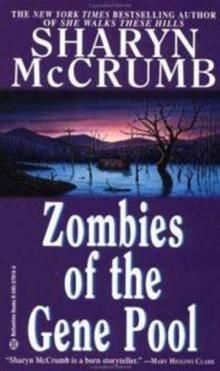 Zombies of the Gene Pool
Zombies of the Gene Pool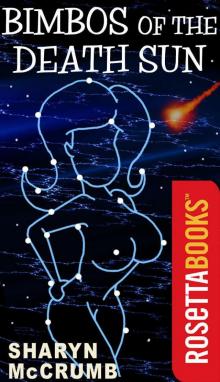 Bimbos of the Death Sun
Bimbos of the Death Sun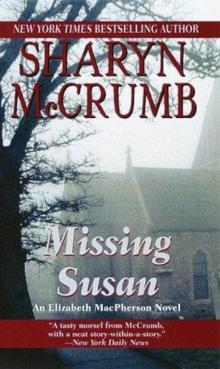 Missing Susan
Missing Susan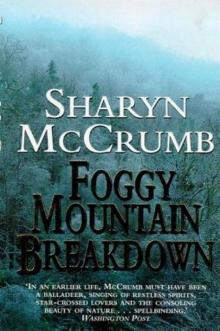 Foggy Mountain Breakdown and Other Stories
Foggy Mountain Breakdown and Other Stories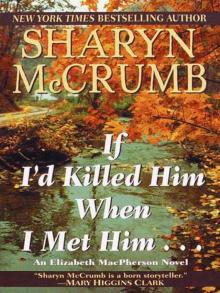 If I'd Killed Him When I Met Him
If I'd Killed Him When I Met Him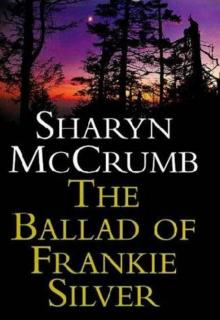 The Ballad of Frankie Silver
The Ballad of Frankie Silver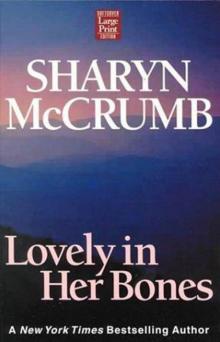 Lovely In Her Bones
Lovely In Her Bones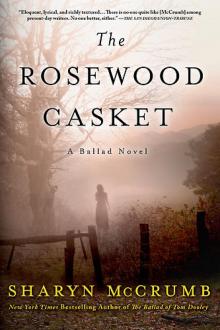 The Rosewood Casket
The Rosewood Casket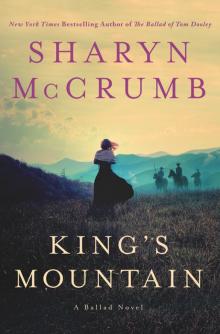 King's Mountain
King's Mountain